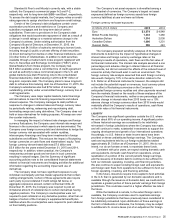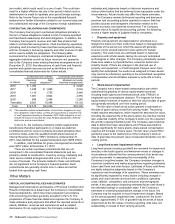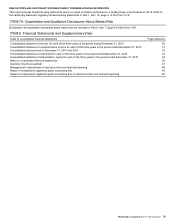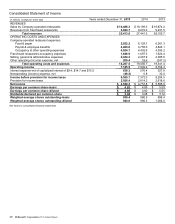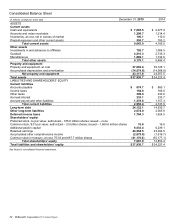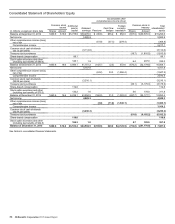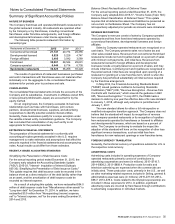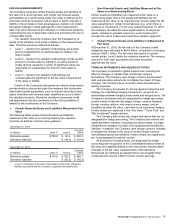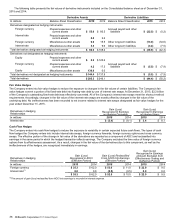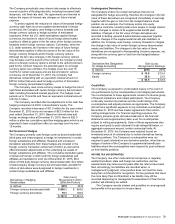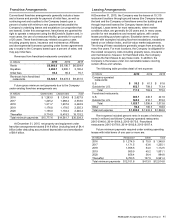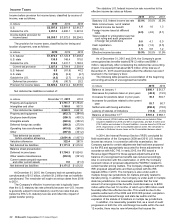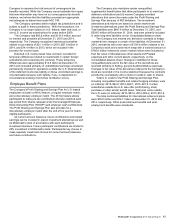McDonalds 2015 Annual Report Download - page 37
Download and view the complete annual report
Please find page 37 of the 2015 McDonalds annual report below. You can navigate through the pages in the report by either clicking on the pages listed below, or by using the keyword search tool below to find specific information within the annual report.
McDonald's Corporation 2015 Annual Report 35
Notes to Consolidated Financial Statements
Summary of Significant Accounting Policies
NATURE OF BUSINESS
The Company franchises and operates McDonald’s restaurants in
the global restaurant industry. All restaurants are operated either
by the Company or by franchisees, including conventional
franchisees under franchise arrangements, and foreign affiliates
and developmental licensees under license agreements.
The following table presents restaurant information by
ownership type:
Restaurants at December 31, 2015 2014 2013
Conventional franchised 21,147 20,774 20,355
Developmental licensed 5,529 5,228 4,747
Foreign affiliated 3,405 3,542 3,589
Franchised 30,081 29,544 28,691
Company-operated 6,444 6,714 6,738
Systemwide restaurants 36,525 36,258 35,429
The results of operations of restaurant businesses purchased
and sold in transactions with franchisees were not material either
individually or in the aggregate to the consolidated financial
statements for periods prior to purchase and sale.
CONSOLIDATION
The consolidated financial statements include the accounts of the
Company and its subsidiaries. Investments in affiliates owned 50%
or less (primarily McDonald’s Japan) are accounted for by the
equity method.
On an ongoing basis, the Company evaluates its business
relationships such as those with franchisees, joint venture
partners, developmental licensees, suppliers, and advertising
cooperatives to identify potential variable interest entities.
Generally, these businesses qualify for a scope exception under
the variable interest entity consolidation guidance. The Company
has concluded that consolidation of any such entity is not
appropriate for the periods presented.
ESTIMATES IN FINANCIAL STATEMENTS
The preparation of financial statements in conformity with
accounting principles generally accepted in the U.S. requires
management to make estimates and assumptions that affect the
amounts reported in the financial statements and accompanying
notes. Actual results could differ from those estimates.
RECENTLY ISSUED ACCOUNTING STANDARDS
Simplifying the Presentation of Debt Issuance Costs
For the annual reporting period ended December 31, 2015, the
Company early adopted the Accounting Standards Update
("ASU") 2015-03, "Interest - Imputation of Interest (Subtopic
835-30): Simplifying the Presentation of Debt Issuance Costs."
This update requires that debt issuance costs be recorded in the
balance sheet as a direct reduction of the debt liability rather than
as an asset, and the amortization of debt issuance costs be
recorded as interest expense.
As a result of adopting this update, we have reclassified $54.0
million of debt issuance costs from "Miscellaneous other assets" to
"Long-term debt" for December 31, 2014. In addition, we have
reclassified $5.9 million from "Nonoperating (income) expense,
net" to "Interest expense, net" for the years ending December 31,
2014 and 2013.
Balance Sheet Reclassification of Deferred Taxes
For the annual reporting period ended December 31, 2015, the
Company early adopted ASU 2015-17, "Income Taxes (Topic 740):
Balance Sheet Classification of Deferred Taxes." This update
requires that all deferred tax assets and liabilities be presented as
non-current on the Balance Sheet. The Company has not
retrospectively adjusted prior periods as amounts were immaterial.
REVENUE RECOGNITION
The Company’s revenues consist of sales by Company-operated
restaurants and fees from franchised restaurants operated by
conventional franchisees, developmental licensees and foreign
affiliates.
Sales by Company-operated restaurants are recognized on a
cash basis. The Company presents sales net of sales tax and
other sales-related taxes. Revenues from conventional franchised
restaurants include rent and royalties based on a percent of sales
with minimum rent payments, and initial fees. Revenues from
restaurants licensed to foreign affiliates and developmental
licensees include a royalty based on a percent of sales, and may
include initial fees. Continuing rent and royalties are recognized in
the period earned. Initial fees are recognized upon opening of a
restaurant or granting of a new franchise term, which is when the
Company has performed substantially all initial services required
by the franchise arrangement.
In May 2014, the Financial Accounting Standards Board
("FASB") issued guidance codified in Accounting Standards
Codification ("ASC") 606, "Revenue Recognition - Revenue from
Contracts with Customers," which amends the guidance in ASC
605, "Revenue Recognition." In July 2015, the FASB made a
decision to defer by one year the effective date of its new standard
to January 1, 2018, although early adoption is permitted as of
January 1, 2017.
The new standard allows for either a full retrospective or
modified retrospective transition approach. The Company does not
believe that the standard will impact its recognition of revenue
from company-operated restaurants or its recognition of royalties
from restaurants operated by franchisees or licensed to affiliates
and developmental licensees, which are based on a percent of
sales. The Company is continuing to evaluate the impact the
adoption of this standard will have on the recognition of other less
significant revenue transactions, such as initial fees from
franchisees for new restaurant openings or new franchise terms.
FOREIGN CURRENCY TRANSLATION
Generally, the functional currency of operations outside the U.S. is
the respective local currency.
ADVERTISING COSTS
Advertising costs included in operating expenses of Company-
operated restaurants primarily consist of contributions to
advertising cooperatives and were (in millions): 2015–$718.7;
2014–$808.2; 2013–$808.4. Production costs for radio and
television advertising are expensed when the commercials are
initially aired. These production costs, primarily in the U.S., as well
as other marketing-related expenses included in Selling, general &
administrative expenses were (in millions): 2015–$113.8; 2014–
$98.7; 2013–$75.4. Costs related to the Olympics sponsorship are
included in these expenses for 2014. In addition, significant
advertising costs are incurred by franchisees through contributions
to advertising cooperatives in individual markets.


